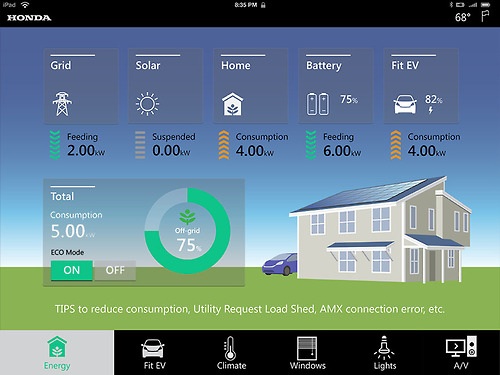Our homes + our cars = 44 percent of greenhouse gas emissions. So what if the two were synced up — as part of the emerging “Internet of Things” or “smart grid” — in an effort to get to zero-carbon status? It’s obviously still a long way off from being a regular thing — hell, so is Tesla — but Honda and UC-Davis just combined on a “smart home” project that looks fairly sweet. Consider just one (just one) technical advancement of the home:
In homes and cars, heating and air conditioning systems consume significant amounts of energy. In the ground beneath Honda Smart Home’s backyard, eight 20-foot deep boreholes allow a geothermal heat pump to harness the ground’s relatively stable thermal sink to heat and cool the home’s floors and ceiling throughout the year. Researchers from UC Davis will evaluate the performance of the system to determine its adaptability to mainstream use. Honda Smart Home’s heating and cooling system is five times more efficient than a comparable home.
There’s more at Fast Company, including the idea that UC-Davis designed the lighting to match the circadian rhythms of those in the home. A house like this actually produces more energy than it consumes, meaning you could get a monthly credit (as opposed to a bill) from the power company while living here.
Here’s a visual of some of the different features:
And of course, the entire thing can be controlled by an iPad/tablet.
The basic reality of this overall situation is that developments like this are good, but also expensive (although you get a lot back) and require a whole-scale change of heart in multiple industries. The only way to ramp that up, process-wise, is to make it something that people can make real money off of (best as I can tell). If you get into a situation where new families outside of traditional eco/green-areas want these types of houses, and the real estate market/development market/bank financing market/construction market all see a chance to get some legit cheddar, then this is going to come along much quicker. It’s kind of ironic in a way that things which could be a really big deal for our planet overall — electric cars, smart grid homes, etc. — basically require everyone to shift their thinking first, hence tipping the financial scales, before they can really hit scale (Tesla might not, depending on what it can do with batteries). Until there’s a legit spike in the demand for smart homes, though, I doubt you’ll see a ton more built — aside from university/corporate projects.

